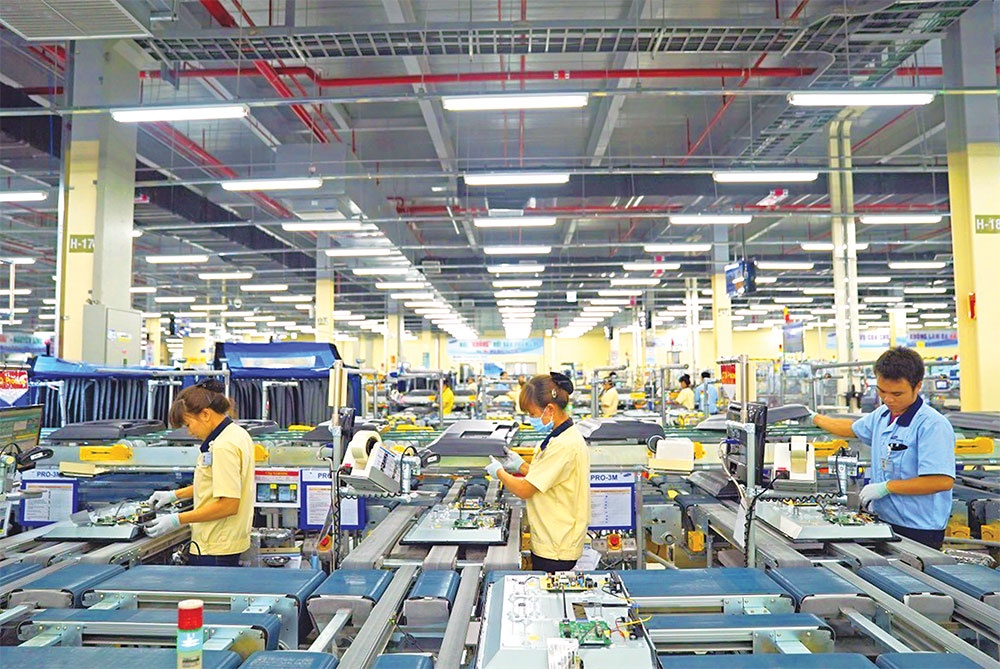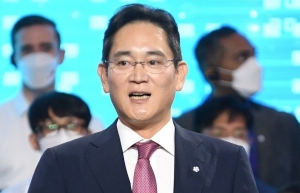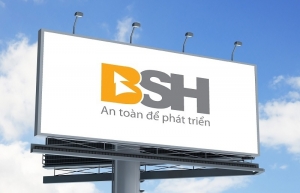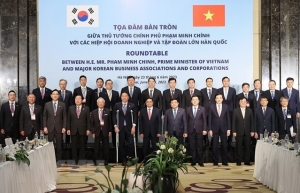Incentives at play for Asian groups to contend with GMT
 |
| Enterprises from South Korea, Japan, and elsewhere are attempting to weigh up the GMT’s pros and cons Photo: Le Toan |
Hong Sun, chairman of the Korea Chamber of Commerce and Industry (KoCham), said that he and its member companies are evaluating the possible impacts of global minimum tax (GMT) on their preparations, while observing the situation in countries around the Asia-Pacific region where South Korean corporations also have investments such as Singapore, Malaysia, Thailand, and Hong Kong.
“It is necessary to have new policies that are both in line with international commitments and can benefit businesses, such as cost-based incentives and support like cash grants or qualified refundable tax credits,” Sun said.
“These policies, if granted on the basis of actual investment costs such as fixed asset, production, and research and development (R&D) costs, are assessed as both beneficial and encouraging enterprises to make long-term, and substantive investment in Vietnam.”
Enterprises from Japan are also in a similar situation. Takeo Nakajima, chief representative of the Hanoi office of the Japan External Trade Organization (JETRO) said, “We are concerned that the GMT will reduce the tax benefits related to substantial businesses by foreign direct investment. In any case, we are watching the development of this tax system in Vietnam with interest.”
According to Nakajima, who is also vice chairman of the Japanese Chamber of Commerce and Industry in Vietnam, the introduction of GMT means that low tax rates will no longer be an essential factor in the competition for the business environment in the region. Vietnam must demonstrate its competitive attractiveness in other elements, such as ease of business, administrative speed, human resources, potential partners, accessible finance, and more.
As shown in last year’s survey by JETRO, when asked about the attractiveness of Vietnam’s investment environment, the top reply was “future growth potential of the market” at 74 per cent, and second was “current market size” at 46 per cent. Around one-quarter of respondents cited “preferential tax treatment,” but it ranked ninth among the replies.
On the other hand, in terms of risk, 60-70 per cent of ASEAN countries cited inefficiency in administrative procedures and tax systems. Low tax rates and business costs are preferable, while incentives are necessary but meaningful if the procedures are simple and transparent, the report said.
Vietnam now has an average corporate tax rate of 20 per cent, alongside its closest neighbours. Among ASEAN countries, the lowest is Singapore, at 17 per cent. Malaysia is 17-24 per cent, Indonesia 22 per cent, and the Philippines 25 per cent. In the case of Vietnam, companies benefit significantly from preferential tax treatment: 10-17 per cent preferential; tax exemption for four years of immunity; and nine years of a 50 per cent reduction, which many Japanese companies use.
Countries in the region are making their first announcements about GMT implementation, and many are urging Vietnam to soon have specific moves.
“Singapore, Malaysia, Thailand, and Hong Kong all have their own declarations on the application of GMT, namely the qualified domestic minimum top-up tax (QDMTT), through budget plans or statements of government agencies,” said Sun of KoCham.
For example, those nations will apply QDMTT from 2024 or 2025 in the first budget plan of the year. Moreover, in some of these countries, there will be new preferential and supportive policies to continue to maintain and increase foreign investment attraction. Thailand announced that it will regulate 50-70 per cent of the additional tax revenue from the QDMTT to transfer it to a fund to support businesses that the country encourages investment from.
“We believe that although these countries have not yet issued specific policies, the early announcements partly help investors better understand the orientation of the receiving country, giving them peace of mind and a basis to make plans to assess possible impacts as well as appropriate investment plans,” Sun noted.
| Vishwa Sharan - Treasurer Indian Business Chamber in Hanoi
Vietnam has been a sweet spot for foreign investment in the Southeast Asia. While a positive business climate, the availability of skilled labour, and a young and growing population have been crucial contributors, tax incentives have equally played an important role in luring funding. However, the upcoming global minimum tax (GMT) on multinationals is a new regime that is likely to have a substantial influence on a huge number of enterprises, including some of our member companies. Companies that meet the threshold and already benefit from certain tax incentives leading to lower tax rates in Vietnam may be obliged to pay additional tax under the GMT. The government has a number of tax incentive schemes that are designed to attract foreign investment, and it is probable that these incentives will become less effective if Pillar Two remedies are implemented. It could make it more difficult for these companies to compete with local companies that are not subject to the GMT. Affected multinationals are likely to explore other jurisdictions for a cost-efficient supply chain. This could be challenging for Vietnam to entice fresh investment in the country. The main apprehension among the business community seems to be that Pillar 2 could have a negative impact on the country’s attractiveness as a destination for foreign investment. Vietnam has already taken steps to align its laws with the international standards, and it is expected to fully implement them soon. This will require careful collaboration with the Vietnamese government and the concerned business community. Astute policies could make Vietnam an attractive destination for foreign investment, even with the increased tax costs. For instance, the government could implement non-tax policies to offset the rising tax burden for multinational groups. This could include providing appealing policies for foreign investment, research and development deductions, land rental subsidies, cutting import taxes, and other exemptions. The government could also support training and skill development schemes for firms or certain benefits for businesses that provide training for their staff. This will help cut the cost of doing business in Vietnam. A qualified domestic minimum top-up tax will also help to ensure that Vietnam collects its fair share of tax revenue from multinational corporations that have a significant presence here. The GMT represents a paradigm shift towards developing a common international tax system. From a tax standpoint, all countries will be on a level playing field. The non-tax incentives and investment attractiveness plan could lower the cost of doing business in Vietnam, and may play a vital role. The government needs to take a holistic approach to the implementation of the GMT by offering incentive schemes, streamlining tax administration procedures, and strengthening the business climate. Vietnam can then ensure that foreign-invested groups continue to come here and contribute to the country’s economic progress. |
 | South Korean chairmen and CEO delegation led by President Yoon Suk Yeol to visit Vietnam Chairmen and CEOs from top South Korean conglomerates, including Samsung, SK, Hyundai, LG, Hanwha, Hanjin, and Hyosung, join President Yoon Suk Yeol on his groundbreaking state visit to Vietnam, fostering a transformative landscape for unprecedented collaboration and growth. |
 | South Korean DB Insurance acquires 75 per cent stake in Saigon - Hanoi Insurance Corporation DB Insurance continues its expansion in the Vietnamese insurance market with the acquisition of a 75 per cent ownership stake in Saigon - Hanoi Insurance Corporation (BSH), following its recent deal to acquire Aviation Insurance, positioning itself as a major player in the industry. |
 | South Korean giants to pour billions of dollars into Vietnam More than 100 MoUs were signed by South Korean and Vietnamese businesses at the Vietnam-South Korea Business Forum on June 23. |
What the stars mean:
★ Poor ★ ★ Promising ★★★ Good ★★★★ Very good ★★★★★ Exceptional
Related Contents
Latest News
More News
- SK Innovation-led consortium wins $2.3 billion LNG project in Nghe An (February 25, 2026 | 07:56)
- THACO opens $70 million manufacturing complex in Danang (February 25, 2026 | 07:54)
- Phu Quoc International Airport expansion approved to meet rising demand (February 24, 2026 | 10:00)
- Bac Giang International Logistics Centre faces land clearance barrier (February 24, 2026 | 08:00)
- Bright prospects abound in European investment (February 19, 2026 | 20:27)
- Internal strengths attest to commitment to progress (February 19, 2026 | 20:13)
- Vietnam, New Zealand seek level-up in ties (February 19, 2026 | 18:06)
- Untapped potential in relations with Indonesia (February 19, 2026 | 17:56)
- German strengths match Vietnamese aspirations (February 19, 2026 | 17:40)
- Kim Long Motor and AOJ Suzhou enter strategic partnership (February 16, 2026 | 13:27)


 Tag:
Tag:




















 Mobile Version
Mobile Version